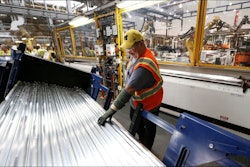
A few weeks ago, Senator Cory Booker (D-NJ) introduced legislation that calls for the creation of a public-private fund which helps private investment firms to leverage government funds to invest in innovative startups that are building new production facilities in the U.S. The Scale-Up Manufacturing Investment Company (SUMIC) Act of 2015 would establish a public-private fund, administered by the Small Business Administration, to offer federal loan guarantees to investors in order to encourage investments in the U.S. in frontier advanced manufacturing technologies.
The fund is a response to the loss of manufacturing capabilities in the U.S. over several decades, a loss not just in the production of commodity products but more recently of sophisticated, complex manufacturing capabilities that are windows into the next generation of products and processes in a range of industries in which the U.S. competes globally.
There are two problems this policy response is trying to address. The first is that start-ups that are trying to commercialize technologies that require sophisticated new manufacturing processes often take a long time (10 years or more) to get to a viable commercial scale. In the process they burn tens or hundreds of millions of dollars before they even collect their first dollar of revenue. The U.S. venture community has largely lost its appetite for funding such development projects, leaving these start-ups to go scale up elsewhere — usually in Asia. Foreign investors (sometimes foreign sovereign wealth funds) will provide low-cost capital to the company as well as other benefits in exchange for scaling production in their country, a way that helps them learn the new technologies, and gives them a shot at being the global nexus for production.
What kinds of technologies are we talking about? Basically anything that comes out of physics — things like semiconductors, advanced materials, clean energy — projects that have a lot of complexity and long design-in cycles. Venture firms argue that there are many more places they can put their money that have less risky development profiles and orders of magnitude better opportunities for returns. Software and social media start-ups, for example, require relatively little capital upfront, so the investment money flows there.
Large firms, like Intel or GE, are also a source of innovation and are investing billions of dollars in big bet long range, complex development programs in the U.S. And they should, because they have already reached a point where profits from current generation products can fund their R&D for the future. But many of the “disruptive” ideas still come from startups who haven’t reached that scale. And large firms are often loathe to take significant risks in completely new directions because they have so much capital tied up in their existing product and process platforms.
The second problem this policy response is trying to address is that it is increasingly difficult to find many of the capabilities in the U.S. to manufacture a new product at scale. Over the past two decades, these skills have been honed in other countries while they have been lost in the U.S. Try finding someone in the U.S. who can manufacture low-temperature polysilicon in volume. Startups that want to commercialize a component or material that goes into a smartphone, television, wearable device, or Internet-of-things devices are going to go to Asia for manufacturing. That’s where the manufacturing infrastructure, the component supply chains, and the production skills are.
The CEOs and investors in these startups that we are concerned with are acting rationally and making good decisions to scale up abroad based on the ROI and incentives in front of them. However, collectively, each of their decisions adds up to a major loss for the U.S. — a loss in investment dollars, manufacturing capabilities and jobs that all build the foundation for innovation for next generation technologies. As our respective research has highlighted, investment in the “industrial commons” has positive spillover effects for our broader innovation ecosystem.
Some may say the Scale Up Fund flies in the face of market forces and we should just let the manufacturing chips fall as they may. But this would ignore the increasingly uneven playing field that exists when it comes to attracting manufacturing investments, and the long-term consequences and social costs to the U.S. of losing its edge in advanced manufacturing technologies. Some of our overseas competitors are treating this kind of capability as a public good. At least they appear to think the line between public and private goods is in a different place.
There are encouraging signs from both the public and private sectors in the U.S. that recognize that the path forward is a path of investment. The Scale Up fund will not solve the manufacturing challenges in the U.S. by itself, but it is a policy response to a market failure that brings resources and attention to this critical challenge for the country.
Elisabeth B. Reynolds, Ph.D. is the Executive Director of MIT’s Industrial Performance Center. William Shih, Ph.D. is an Associate Professor in the Department of Biological Chemistry and Molecular Pharmacology at Harvard Medical School and the Department of Cancer Biology at the Dana-Farber Cancer Institute.
To read more manufacturing and technology news, sign up for our newsletter. You can also follow Manufacturing Business Technology on Twitter @MBTwebsite.






















